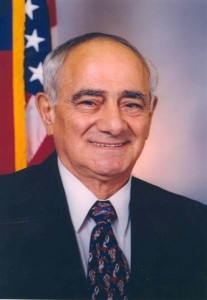
HARRISBURG – State Rep. Camille “Bud” George, D-74 of Clearfield County, pushed for ProtectPA legislation that features responsible environmental regulations that exceed those recommended by Gov. Tom Corbett’s Marcellus Shale Advisory Commission.
“What we’ve seen over the last several months is an industry-dominated commission, established by a governor who received more than $1 million in campaign contributions from gas companies, offer few meaningful remedies for a process that has already polluted people’s water,” George said.
“It’s unfathomable and unconscionable to put people’s safety at risk as this industrial tide sweeps the Commonwealth.
“The people of Pennsylvania should be the Legislature’s advisory commission,” George said. “The ProtectPA measure that I am unveiling puts their concerns and safety first and foremost.”
George, Democratic chair of the House Environmental Resources & Energy Committee, said that it is irresponsible to empower a profit-driven industry to regulate itself when the very people paying for the gas – Pennsylvania consumers – also will be paying for environmental remediation when accidents occur.
“The solution is two-fold,” George said. “On one side, we must implement stronger safeguards than those recommended by the commission to reduce the potential of environmental catastrophe.
“On the other side, we must set aside money through a responsible tax on the industry that will pay for the costs of cleaning up the spills that will occur, repair the infrastructure that will be damaged, and direct money to local governments that already feel the impact of industrial gas drilling.”
George said his compromise legislation will do just that, and he intends to introduce the bill shortly.
“This bill, ProtectPA, combines everything in one important package,” he said.
Components of George’s bill include increasing the distance that wells may be placed from public drinking water sources, fuller disclosure of the chemicals used in hydraulic fracturing, updated bonding and road-repair requirements, and an extension of a well operator’s presumed liability in cases of well pollution.
Other requirements include “cradle-to-grave” tracking of Marcellus wastewater, expanding pre-drilling survey rights for landowners, and prohibiting open-pit frac water storage in flood plains.
Several of the land and water protection provisions in Rep. George’s bill mirror those made by Department of Environmental Protection Secretary Mike Krancer in a May 27 letter to Lieutenant Governor Jim Cawley, who chairs the governor’s advisory commission.
Besides the measures recommended by Sec. Krancer, the DEP also called for greater penalties against drillers who violate the state’s Oil and Gas Act. The increased fines also appear in the ProtectPA bill.
George’s bill also would direct money toward the entities and projects most harmed by gas drilling.
The bill levies a tax of 30 cents per 1,000 cubic feet of gas severed, with an adjustment mechanism if the price of gas changes. Revenue would go directly to local governments, infrastructure repair, and environmental programs. There is no unrestricted revenue directed to the General Fund.
“This ProtectPA bill is not a cash-cow for the Commonwealth,” George said. “This bill puts the money where it belongs – to the people and places directly impacted by the drilling.”
George’s severance tax language is similar to a bill he introduced in March. The measure, House Bill 833, was referred to committee and has seen no action by the GOP-led House.
Based on Penn State projections, more than $169 million would be distributed after the first year to municipalities and counties impacted by drilling and another $96 million would go to the Pennsylvania Infrastructure Investment Authority – Pennvest – for treatment plants that treat drilling wastewater.
More than $48 million annually would go toward repairing roads and bridges damaged by gas drilling.
The Environmental Stewardship Fund, which funds Growing Greener, remains desperate for funding support after the most recent budget. The fund, which invests in farmland preservation, open-space conservation, restoring and protecting streams and rivers, and improving and expanding state and local parks, would receive a life-saving $72 million annually under the George proposal.
County Conservation Districts receive money, as would the PA Fish and Boat and Game commissions.
To address environmental disasters, both the Hazardous Sites Cleanup Fund and the newly created Oil and Gas Environmental Disaster Recovery Account would receive annual revenues from Rep. George’s bill.
“My legislation puts money where it belongs,” George said. “My bill also includes a tax credit for gas companies who create jobs for Pennsylvanians.”
While George’s bill does take some recommendations from the advisory commission and makes them stronger, he cautioned that some commission recommendations may appear to be environmentally friendly, but are actually disguised gifts to the gas industry.
“One commission recommendation is a review of well-spacing requirements on leased land,” George said. “This is not a gas industry’s attempt to lessen the environmental impact of wells by spacing them out, but rather a gateway to create plots in a manner that forced-pooling can be thrust upon landowners who do not want drilling, but are adjacent to lands that have been leased.”
George remains adamant that the right of a landowner to lease – or not lease – his or her land must be protected, and he opposes any policy that allows eminent domain to be declared on a landowner.
“There has to be a balance between environmental protection, job creation, and landowner rights,” George said. “I urge my colleagues on both sides of the aisle to set aside partisanship and do what’s right for the people of Pennsylvania.”


